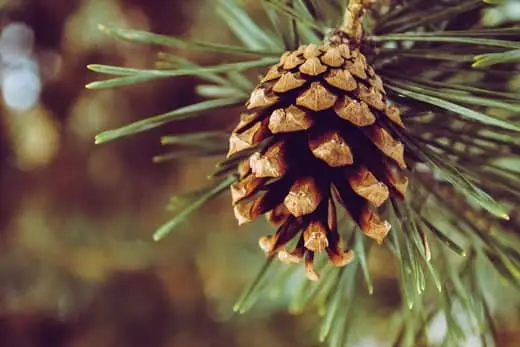This website is supported by its readers. If you click one of my links I may earn a commission. I am also a participant in the Amazon affiliates program and I will also earn a commission from qualified purchases.

Aside from making excellent bonsai trees, one of the perks of growing Juniper trees is simply the berries that grow with the tree after a few short years. If you are naturally developing a Juniper tree, you might be wondering, how much does a Juniper berry weigh?.
A single Juniper berry will weigh between 0.5 and 2 grams per berry. A cone of Juniper berries that consists of 8 to 15 berries will weigh 16 to 30 grams.
Store-bought Juniper berries typically come in 100g to 5kg packages.
However, different sub-species of Juniper berry will weigh different amounts depending on the species of Juniper tree.
So what causes some Juniper berries to weigh more? And what is the average weight of a Juniper berry?
Keep reading to find out more!
Just a quick heads up, over the past three years of running Plantpaladin, hundreds of people have asked for product recommendations. As such, You can find my favorite indoor bonsai tree here (link takes you to Bonsaiboy), my favorite outdoor bonsai tree (link takes you to Bonsaiboy), or have a look at all the products I recommend here.
How much does a Juniper berry weigh?
To get the most accurate answer to how much a does a Juniper berry weigh, I undertook the following:
- Weighed the berries my Juniper produces.
- I contacted my local botanical gardens and asked ten plant paladin readers how much their Juniper berries weighed.
- I even visited a few different stores to consider the weight of store-bought Juniper berries.
This was done to ensure that you had the most accurate post on how much a Juniper berry weighs.
To summarize:
- A single Juniper berry typically weighs 1.5 grams, with most Juniper berries weighing between 0.5 grams to 2 grams.
- Juniper berries grow in the wild as a seed cone in the female part of the tree.
- These seed cones are usually fleshy and contain merged scales resembling berries more than typical cones that you might see on pine cones.
- Each of these cones will hold between 8 to 15 berries and weigh 16 to 30 grams in total, with most Juniper berry seed cones weighing 20 grams.
- Juniper berries are also commonly available in stores, mass-produced, and sold in packs.
- These packs contain hundreds of individual Juniper berries and come in weight ranges from 100 grams to 2 kilos (3.5 ounces to 70 ounces)
- Most stores, however, will sell these in smaller 100-gram packages that contain between 100 to 200 individual Juniper berries.
- Junipers come in a wide variety of sub-species whose berries come in different sizes.
- Some species, such as Juniper Drupacia (Syrian Juniper), will typically have the largest-sized Juniper berries, which weigh between 4 to 6 grams per Juniper berry.
How much does a Juniper berry weigh?
On average, Juniper berries weigh 0.5 to 2 grams (0.03 to 0.07 oz) per berry, with most Juniper berries weighing 1.5 grams per berry. The cone that these Junipers grow from will weigh between 16 to 30 grams per seed cone.
Most Juniper berries from most Juniper species will fall into this category, such as the Common Juniper (Juniperus Communis), Chinese Juniper (Juniperus Chinensis), Dripping Juniper (Juniperus Flaccida), and Eastern Red Cedar (Juniperus Virginiana)
Now I know a lot of you will be more visual, so hopefully, the table below will help put some things in perspective:
Type of Juniper Berry | Weight |
Average Juniper berry weight from most common species | 1 to 2 grams per berry |
Small Juniper berry | 0.2 to 0.5 grams |
Medium Juniper Berry | 1 to 3 grams |
Large Juniper berry | 4 to 6 grams |
Small Juniper berry cone | 10 to 15 grams |
Average Juniper berry cone | 16 to 30 grams |
Large Juniper Berry Cone | 30 to 45 grams |
How much does a small Juniper berry weigh?
A small Juniper berry will typically weigh 0.2 to 0.5 grams per berry. Small Juniper berry cones weigh 10 to 15 grams per cone, typically containing 8 to 15 individual berries.
Smaller Juniper berries will typically be 4 to 6mm in diameter and 3 to 5mm high.
How much does a medium Juniper berry weigh?
A medium Juniper berry will typically weigh 1 to 2 grams per berry. Medium Juniper berry cones weigh 16 to 30 grams per cone, typically containing 8 to 16 individual berries.
Medium Juniper berries will typically be 4 to 12mm in diameter and 3 to 11mm high.
How much does a large Juniper berry weigh?
A large Juniper berry will typically weigh 2 to 4 grams per berry. Large Juniper berry cones weigh 30 to 40 grams per cone, typically containing 15 to 20 individual berries.
Large Juniper berries will typically be 4 to 12mm in diameter and 3 to 11mm high.
How much does a Juniper berry cone weigh?
Juniper berry cones weigh 20 grams. The average weight range for a Juniper berry cone will be 16 to 30 grams. Juniper berry cones will typically have between 8 to 15 individual berries.
Juniper species such as Juniper Drupacia, which have larger berries, will typically weigh more.
Expect the average weight to be between 25 to 40 grams per Juniper berry cone for these berry cones.
What are Juniper berry cones?
Juniper berry cones are the female seed cone produced by most Juniper species.
These cones are similar to pine cones that traditional evergreen and pine species produce.
However, the main difference is that instead of having a hard, wood-like scale, these cones instead look like a bunch of berries.
While often referred to as berry cones, Juniper berries are not berries and are instead more closely related to the cones of other evergreen species.
Unlike traditional seed cones, however, the scales remain fleshy, eventually covering the seeds of the Juniper, giving a berry-like appearance.
Hopefully, the images below will help shed some more light on the differences:


Species of Juniper berry that weigh the most?
Juniper Drupacia (also known as the Syrian Juniper) typically produces among the largest-sized Juniper berries. These berries weigh between 4 to 6 grams per Juniper berry. Generally, these berries are 20 to 28mm in diameter and 18 to 26mm in height.
Other Juniper species that are larger and produce larger berries include:
- Greek Juniper
- Creeping Juniper
With over 60 species of Juniper, however, there will be a great deal of variation.
To help, I’ve listed the most common species below in the table:
Species | Juniper berry weight |
Common Juniper | Medium (1 to 2 grams per berry) |
Chinese Juniper | Medium (1 to 2 grams per berry) |
Greek Juniper | Large (4 to 6 grams per berry) |
Creeping Juniper | Large (4 to 6 grams per berry) |
Juniper Drupacia | Large (4 to 6 grams per berry) |
Eastern Red Pine | Medium (1 to 2 grams per berry) |
Dripping Juniper | Medium (1 to 2 grams per berry) |
One-seed Juniper | Large (4 to 6 grams per berry) |
Rocky Mountain Juniper | Medium (1 to 2 grams per berry) |
Irish Juniper | Small (0.5 grams per berry |
How big are Juniper berries?
Most Juniper berries are 4 to 12 mm in diameter and 3 to 11mm in height. Typically Juniper berries are 6mm in diameter and height. These berries will weigh 1 to 2 grams per berry.
Juniper trees that produce larger berries, such as Juniper Drupacia, will typically be 20 to 28mm in diameter and 18 to 26mm in height.
These larger berries can weigh between 4 to 6 grams per berry.
Juniper berries that produce smaller berries will typically be 4 to 6mm in diameter and 3 to 5 mm in height.
How much does a Juniper berry weigh when it is young?
Juniper berries will weigh about half as much when they start to grow compared to when they have matured. Young Juniper berries from the average Juniper tree will weigh 0.2 to 0.5 grams compared with 1 to 2 grams when developed.
Younger Juniper berry cones will also weigh less when compared to mature Juniper berry cones.
These cones will typically weigh one-third that of a Juniper cone.
Young or adolescent Juniper cones will weigh between 8 to 16 grams compared to the 16 to 30 grams that mature Juniper cones tend to weigh.
To help explain more, the table below should indicate the different berry lifecycles:
Lifecycle | Weight |
Youth | 0.2 to 0.3 grams |
Adolescence | 0.3 to 1 gram |
Maturity | 1 to 2 grams |
How much do store-bought Juniper berries weigh?
While some of you are reading this and will be curious about your Juniper berries, many of you will be reading this to understand how much Juniper berries weigh from store-bought packs.
Individual Juniper berries bought from a store typically weigh 1 to 3 grams. These berries are commonly found in 100-gram packages, typically containing between 80 to 120 individual berries.
While Juniper berries from stores usually use Syrian Junipers, the largest subspecies of juniper berries. These berries are larger, weighing between 3 and 6 grams per berry.
These berries will typically be slightly smaller if bought from a store than natural organic Juniper berries you pick from your tree – mainly due to the processing in manufacturing sites.
Juniper berries can be found in larger packages, with most stores having the option to purchase 2kg packs of Juniper berries.
What makes a Juniper berry weigh more?
The main factors that cause a Juniper berry to weigh more include:
The species it comes from
Not all Juniper trees are created equally. As such, some subspecies will produce much larger berries than others.
The size of the tree
There is typically a correlation between the size of a Juniper tree and the size of the berries it produces.
Juniper berries that a larger will either produce a higher volume of berries via their seed cones or produce larger overall berries.
Fertilizer
Fertilizers and other nutrients are used to help Junipers grow.
If fertilizers are rich in nutrients and have a balanced NPK ratio, this can cause Juniper berries to grow much more prominent.
On the other hand, liquid fertilizers can cause the leaves and trunk of the tree to grow more and take away from the growth of the berries of a Juniper.
How long does it take for Juniper berries to grow?
Juniper berries typically take 8 to 24 months to grow and ripen. On average, however, Juniper berries will take 18 months to reach maturity. Faster growing species will mature between 8 to 10 months, with larger species that produce larger fruits typically taking 24 months.
When they mature, these seeds/berries will start as green and turn a dark purple or blue.
Why is it important to know the weight of a Juniper berry?
It is essential to know the weight of a Juniper berry for a few reasons.
First, cats, dogs, and other animals are notorious for chewing and biting Juniper berries.
They can very easily get lodged in your pet’s throats.
Knowing the size and weight of the berry your Juniper produces will indicate if your pet will choke on them.
Juniper berries are also commonly used as a spice or added to foods.
Often these recipes only require a small number of Juniper berries and so knowing the weight will give you a rough indication of the measurements needed to make your delicacy of choice.
Juniper berries also bloom during winter, meaning that if you live in temperatures below 14 degrees Fahreinhight during winter, consider winterizing your Juniper.
How to care for a Juniper tree?
Now if you are in the process of growing out a juniper tree to harvest berries from it, I’d consider checking out the table below:
Apple bonsai tree requirements | Explained |
Water | 3 times per week in the spring and summer. Once to twice per week in the winter. |
Sunlight | 4 hours of direct sunlight per day. |
Temperature | 14 to 85 degrees Fahrenheit |
Fertilizer | once per month in the spring and summer - avoid in fall and winter. |
Repotting | Once every 2 to 3 years |
Placement | Outdoors only |
Species Type | Coniferous |
Wire type | Both copper and aluminum |
Time to grow from seed | 3 years |
Potting Soil | Inorganic mix of akadama and volcanic ash rock. Organic soil such as peat soil can also be used. |
Growth type | Medium growth - adds 5 to 12 inches per year in height. |
Size | Medium to large, most trees sold is typically two hand bonsai. |
Lifespan | 500 years + |
My top picks for the gear you will need!
So like I mentioned earlier, over the past three years of running PlantPaladin, hundreds of people have asked me for my recommendations on the best bonsai gear on the market.
Having spent thousands of dollars on bonsai items these past few years and tested at least 100 bonsai-specific products, I’ve listed my favorite products below – All of which I highly recommend and think you can get great value.
They can purchase directly by clicking the link to take them to Amazon.
Bonsai Tool Set: One of the significant challenges I’ve had is finding a toolset that was not only durable but didn’t break the bank. SOLIGT has recently developed a fantastic bonsai tool set that covers all the tools you need to trim, prune, and repot your trees. – You can grab it here.
Complete Bonsai Set: Many of you will want to grow your bonsai trees entirely from scratch, but finding the varicose seeds, pots, and other items in one place can be challenging. Leaves and Sole then have created a complete bonsai set that I’ve personally used that ticks all the boxes. You can grab it here.
Bonsai wire: The number of times I’ve run out of wire for my bonsai or purchased cheap bonsai wire that doesn’t do the job is embarrassing for me to admit. After a lot of trial and error, I found that using Hotop’s aluminum bonsai wire is one of the best options on the market. This can easily be used for both indoor and outdoor bonsai. You can grab it here.
This post was written by Fehed Nicass who has been passionate about bonsai for over 3 years. He currently resides in the UK and works in sales.

